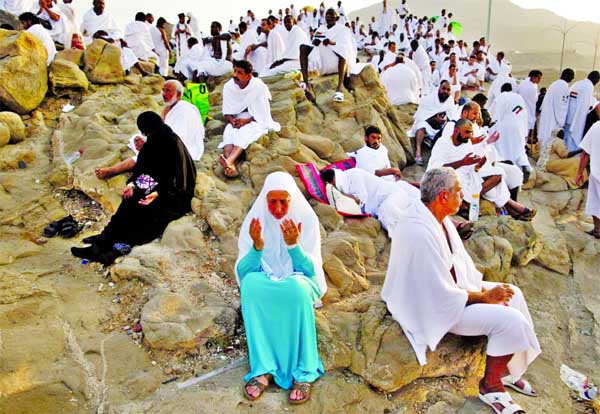
Before dawn on Sunday, Muslim pilgrims from around the world began ascending a hill just outside Mecca where the Prophet Muhammad delivered his final sermon some 1,400 years ago.
The day spent on Mount Arafat is the pinnacle of the five-day hajj pilgrimage, which all able-bodied Muslims are required to perform at least once. Muslims spend the day there in deep prayer, many openly weeping as they repent and ask Allah for forgiveness.
Prayer on this day at Mount Arafat, about 20 kilometres east of Mecca, is believed to offer the best chance of erasing past sins and starting anew. Many Muslims who are not performing the hajj fast from dawn to dusk on this day, for similar reasons. Many of the roughly two million pilgrims taking part in this year’s hajj will climb a hill called Jabal al-Rahma, or mountain of mercy, in Arafat and spend time there in supplication. It was here where the Prophet Muhammad delivered his final sermon, calling for equality and for Muslims to unite.
The white terrycloth garments worn by men throughout the five-day hajj are forbidden to contain any stitching – a restriction meant to emphasize the equality of all Muslims and prevent wealthier pilgrims from differentiating themselves with more elaborate garments.
The day on and around Arafat is the one time during the hajj when roughly all pilgrims are in the same place at the same time. The sight of people from more than 160 different countries, with all the men dressed in simple white garments, is breathtaking. Egyptian pilgrim Mahmoud Awny said the feeling of being in Arafat is “indescribable.” “All Muslims on Earth wish they could have been here today. Thanks to Allah for enabling me to be here,” he said. The hajj is a physically and emotionally exhausting experience, and this year temperatures soared to 42 C in Arafat. Volunteers passed out water, juice and umbrellas to shade pilgrims from the sun.
Around sunset, the pilgrims will head to an area called Muzdalifa, nine kilometres west of Arafat. Many walk the route, while others use buses. They spend the night there, most in the open air huddled near one another, and pick up pebbles along the way that will be used in a symbolic stoning of the devil in Mina, where Muslims believe the devil tried to talk the Prophet Ibrahim – named Abraham in the Bible – out of submitting to God’s will.

